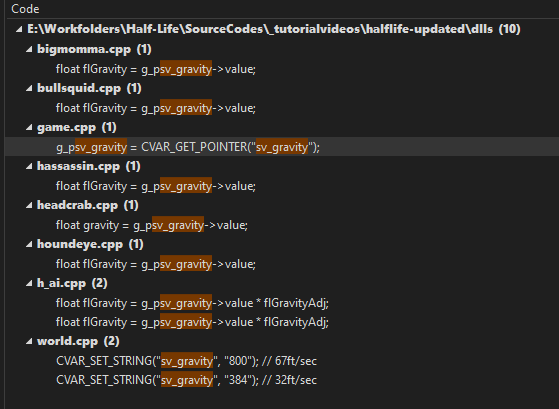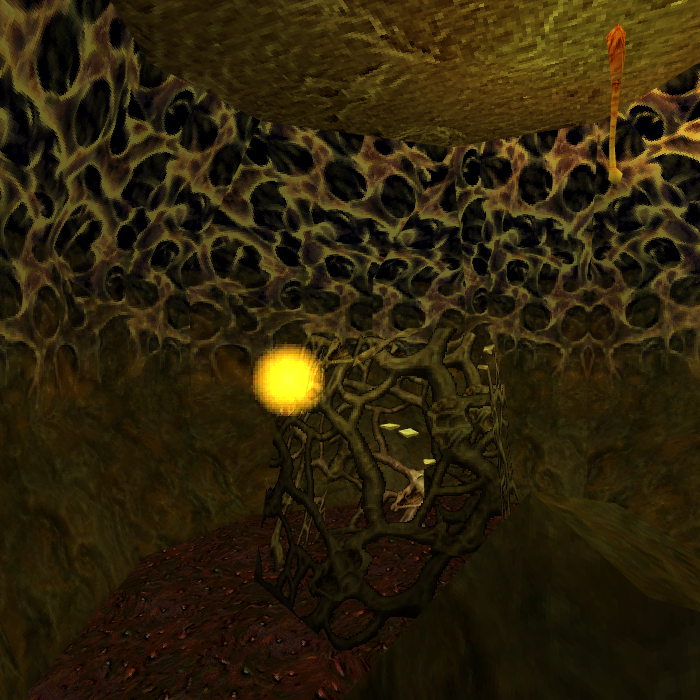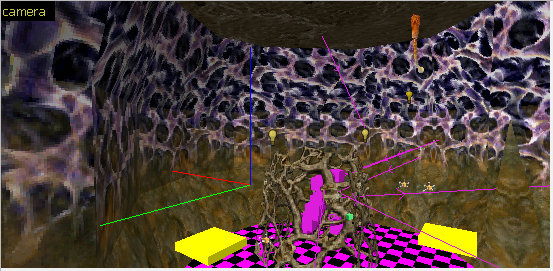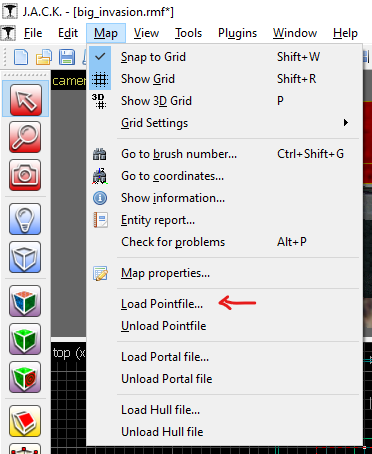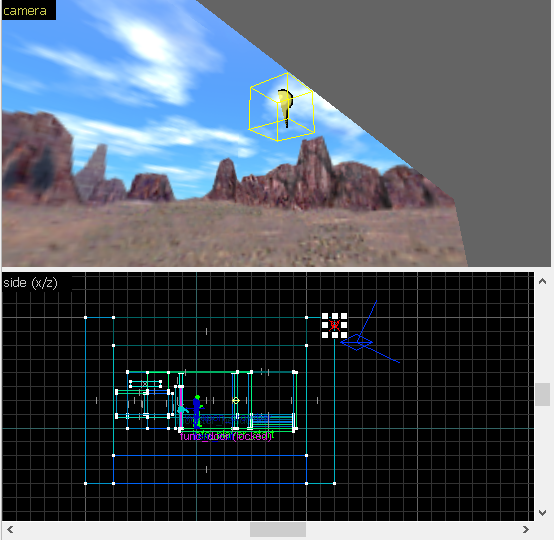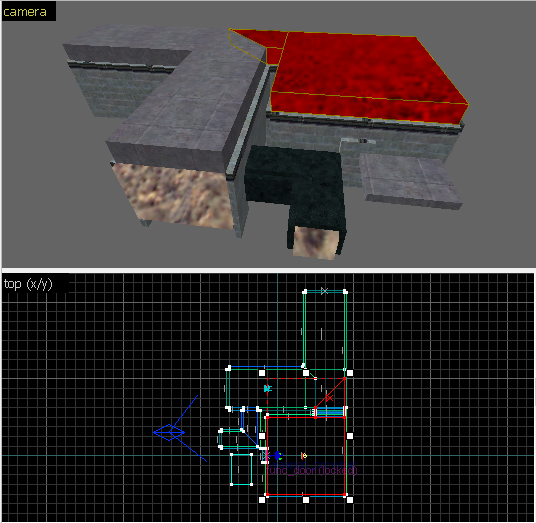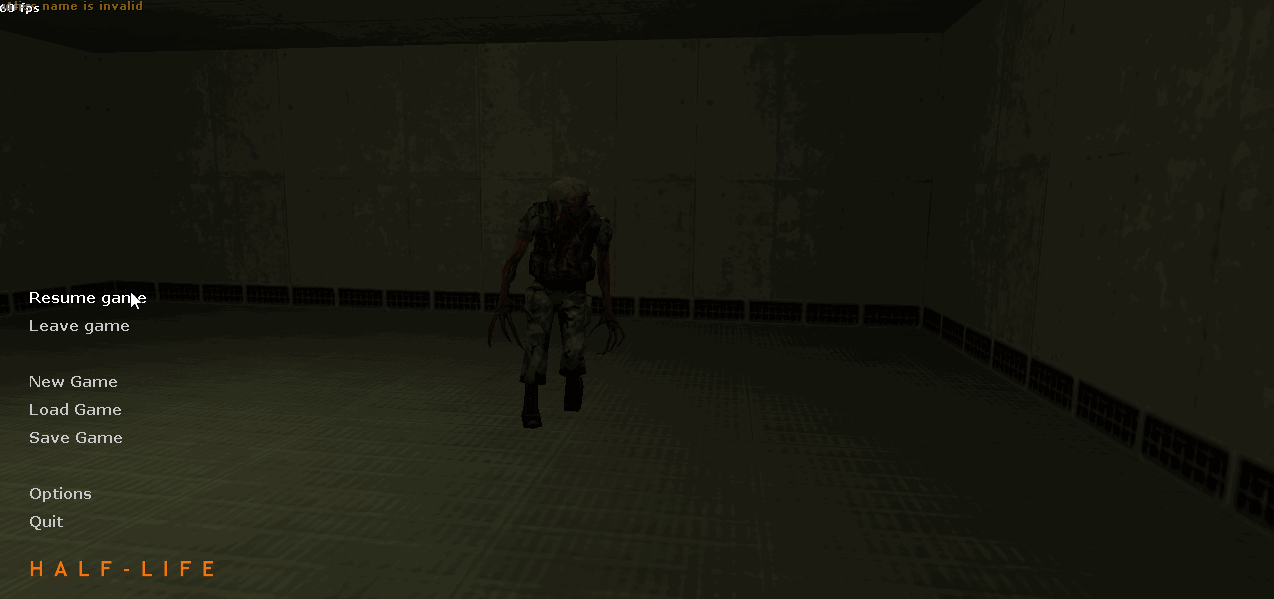Would the Playlist I mentioned Before help me with the HLSDK coding?
Why would FortressOne be easier to mod? How would I mod that?
Forum posts
Posted 1 year ago2023-10-13 18:35:20 UTC
in Can I use Half-Life SDK to directly edit Team Fortress Classic? Post #347951
in Can I use Half-Life SDK to directly edit Team Fortress Classic? Post #347951
Posted 1 year ago2023-10-13 10:42:58 UTC
in Can I use Half-Life SDK to directly edit Team Fortress Classic? Post #347950
in Can I use Half-Life SDK to directly edit Team Fortress Classic? Post #347950
TFC did start out as a HL1 mod, a port of the original Team Fortress from Quake, and later released as a standalone game (although pretty much still just a HL1 mod, which becomes fairly obvious considering all the shared assets and the Hunted map being modified parts of a section of HL1's campaign).
So the timeline of the games goes something like:
So if you want to make a mod that's similar to TFC in terms of gameplay and feel etc, starting out with HLSDK and recreating the mechanics would be the way to go.
As for FortressOne, it's just an open source version of the original TF using the QuakeWorld engine (which has better networking than Quake) and would be the easiest base game to mod, but its code could possibly be used as a guideline on how to implement certain mechanics into your own mod.
So the timeline of the games goes something like:
- Team Fortress (Quake and later QuakeWorld)
- Team Fortress Classic (Half-Life 1 mod and later standalone GoldSrc game)
- Team Fortress 2 (Source)
So if you want to make a mod that's similar to TFC in terms of gameplay and feel etc, starting out with HLSDK and recreating the mechanics would be the way to go.
As for FortressOne, it's just an open source version of the original TF using the QuakeWorld engine (which has better networking than Quake) and would be the easiest base game to mod, but its code could possibly be used as a guideline on how to implement certain mechanics into your own mod.
Posted 1 year ago2023-10-13 09:06:14 UTC
in Can I use Half-Life SDK to directly edit Team Fortress Classic? Post #347949
in Can I use Half-Life SDK to directly edit Team Fortress Classic? Post #347949
If this is going to be tough, would a Better route to be recreating Team Fortress but in Half-Life? They both use the Goldsrc engine, theres an official SDK, and doesn't half-life have source code available? Why does this remind me of creating a roblox game?
What is Open Source Fortress? Does it run on Source, Goldsrc, or the original Quake engine? Could I make a mod of that instead?
So Far I like the Quake option better, but I could be wrong. This is giving me vibes of making a Roblox game lol.
What is Open Source Fortress? Does it run on Source, Goldsrc, or the original Quake engine? Could I make a mod of that instead?
So Far I like the Quake option better, but I could be wrong. This is giving me vibes of making a Roblox game lol.
Posted 1 year ago2023-10-13 06:11:28 UTC
in Can I use Half-Life SDK to directly edit Team Fortress Classic? Post #347948
in Can I use Half-Life SDK to directly edit Team Fortress Classic? Post #347948
Since there's no publicly available game code for TFC, there's likely not much you can do other than recreating the mechanics in HLSDK as its own mod as Shepard says.
There's an open source fork of the original Team Fortress which may or may not come in handy.
There's an open source fork of the original Team Fortress which may or may not come in handy.
Posted 1 year ago2023-10-13 03:26:05 UTC
in Can I use Half-Life SDK to directly edit Team Fortress Classic? Post #347947
in Can I use Half-Life SDK to directly edit Team Fortress Classic? Post #347947
I won't use Metamod that much then if it won't give me full access to full modding of Tfc.
So what would I use instead of Metamod to re-program Tfc? (So I could add new things like Classes)
Because I had this idea where the Player could press some key like "R" to change the existing class selection panels to change out the Classes instead of me adding new panels altogether.
So what would I use instead of Metamod to re-program Tfc? (So I could add new things like Classes)
Because I had this idea where the Player could press some key like "R" to change the existing class selection panels to change out the Classes instead of me adding new panels altogether.
Posted 1 year ago2023-10-12 18:47:22 UTC
in Can I use Half-Life SDK to directly edit Team Fortress Classic? Post #347946
in Can I use Half-Life SDK to directly edit Team Fortress Classic? Post #347946
The source code of TFC is not available to the public and I heavily doubt Valve would agree to release it as they made crystal clear that they would stop doing so in response to the various leaks in the past years.
There are some TFC elements in the HL source code like the player and class selection panels and minor things but the rest such as weapons, game modes, player classes themselves and many more will have to be re-programmed by yourself.
As for Metamod, AFAIK, you will only be able to change existing stuff so forget about adding new stuff like classes.
There are some TFC elements in the HL source code like the player and class selection panels and minor things but the rest such as weapons, game modes, player classes themselves and many more will have to be re-programmed by yourself.
As for Metamod, AFAIK, you will only be able to change existing stuff so forget about adding new stuff like classes.
Posted 1 year ago2023-10-12 08:36:40 UTC
in Can I use Half-Life SDK to directly edit Team Fortress Classic? Post #347945
in Can I use Half-Life SDK to directly edit Team Fortress Classic? Post #347945
Do I need access to the Source Code of Tfc (Which there is none available I think) To add something like New Classes though? Or is it where some Code is visible & you can edit?
How I was going to do it where the player would press "R" or something to change the Classes instead of adding new numbers, as that part could be locked? Idk. For "0" instead of a Random Class I was going to make it a Commander Class.
I was going to make the Keycard part where any class could pick it up & use it, I was going to add new colors as well.
Do you know of someone else who knows about Metamod I could ask this to? Could the Valve Modding Community Discord Server give me answers too?
How I was going to do it where the player would press "R" or something to change the Classes instead of adding new numbers, as that part could be locked? Idk. For "0" instead of a Random Class I was going to make it a Commander Class.
I was going to make the Keycard part where any class could pick it up & use it, I was going to add new colors as well.
Do you know of someone else who knows about Metamod I could ask this to? Could the Valve Modding Community Discord Server give me answers too?
Posted 1 year ago2023-10-12 06:54:54 UTC
in Can I use Half-Life SDK to directly edit Team Fortress Classic? Post #347944
in Can I use Half-Life SDK to directly edit Team Fortress Classic? Post #347944
New classes and weapons sounds like code territory. As far as I know we only have HL1, Op4 and BS code SDKs but none for TFC and I'm unsure what options we have there.
Perhaps something like Metamod could be used? I've never messed around with that sort of stuff myself so can't really tell how much it could help you here.
Doors and keycards (regardless of class) is vanilla goldsrc so that's definitely doable.
Making it class-specific, on the other hand, iirc the TFC entities only had logic for team-specificity so might need code work to get that.
Perhaps something like Metamod could be used? I've never messed around with that sort of stuff myself so can't really tell how much it could help you here.
Doors and keycards (regardless of class) is vanilla goldsrc so that's definitely doable.
Making it class-specific, on the other hand, iirc the TFC entities only had logic for team-specificity so might need code work to get that.
Posted 1 year ago2023-10-11 15:16:37 UTC
in Lost media of Half-Life or Counter-Strike (GoldSource) Post #347943
in Lost media of Half-Life or Counter-Strike (GoldSource) Post #347943
PigFactory2003b by VooDooPig (http://web.archive.org/web/20031112152953/http://cariad.netfirms.com/twhl/mapvault_map.php?id=4)
Second after cs_canbunk, seems to of been in testing during that archived post.
Second after cs_canbunk, seems to of been in testing during that archived post.
Posted 1 year ago2023-10-11 13:57:33 UTC
in Can I use Half-Life SDK to directly edit Team Fortress Classic? Post #347942
in Can I use Half-Life SDK to directly edit Team Fortress Classic? Post #347942
I wanted to add new Classes to my Tfc Mod, Could I do that? Same goes with Weapons, and this idea where any class could pick up a Keycard to unlock a door.
Posted 1 year ago2023-10-11 08:33:59 UTC
in Can I use Half-Life SDK to directly edit Team Fortress Classic? Post #347940
in Can I use Half-Life SDK to directly edit Team Fortress Classic? Post #347940
As for Valve's approval, don't worry about that. I don't think they even acknowledge TFC anymore, and even if they did they'd just be positive about it as they've always been about mods*.
(*except for HDTF, but you can't really call that a mod, and besides we don't talk about that dumpster fire anyway)
(*except for HDTF, but you can't really call that a mod, and besides we don't talk about that dumpster fire anyway)
Posted 1 year ago2023-10-11 08:18:52 UTC
in Can I use Half-Life SDK to directly edit Team Fortress Classic? Post #347939
in Can I use Half-Life SDK to directly edit Team Fortress Classic? Post #347939
TFC is still being played. It's not as popular as it used to be, but there's at least a couple communities still around with regular players.
I'm not sure if there's any game code available, and engine code is definitely off the table, but if all you want to do is add new maps then all that isn't needed. If you're not changing anything code-wise you can just use TFC as the base game (iirc you can put
The making of and publishing of custom TFC maps is over two decades old and I'm sure the remaining players (including me) would be very grateful to try out new maps 😊
I'm not sure if there's any game code available, and engine code is definitely off the table, but if all you want to do is add new maps then all that isn't needed. If you're not changing anything code-wise you can just use TFC as the base game (iirc you can put
"fallback_dir" "tfc" in liblist.gam), but if custom maps is all you're planning on making you don't even need to make a mod for that. Just publish those maps on their own and anyone already owning TFC can play those without getting a separate game/mod for it!The making of and publishing of custom TFC maps is over two decades old and I'm sure the remaining players (including me) would be very grateful to try out new maps 😊
Posted 1 year ago2023-10-10 23:21:03 UTC
in Can I use Half-Life SDK to directly edit Team Fortress Classic? Post #347938
in Can I use Half-Life SDK to directly edit Team Fortress Classic? Post #347938
But wait, would Valve not approve of me making a Tfc mod though? Or is it okay as long as I don't steal any of their code & make the game free to play? But am I required to "steal" code to make my mod work? Or could I just write my own Code but it does the same thing? Or should I just make my mod unique in general? I was going to add different maps to it.
Posted 1 year ago2023-10-10 04:23:18 UTC
in Can I use Half-Life SDK to directly edit Team Fortress Classic? Post #347937
in Can I use Half-Life SDK to directly edit Team Fortress Classic? Post #347937
Are people still even playing Team Fortress Classic? Because I might actually make a Tf2 mod instead if no one is going to even play the Mod, or are there people out there who would be interested?
ChatGPT was also telling me to look somewhere else for help after I started asking it more advanced Goldsrc questions, so I came here
ChatGPT was also telling me to look somewhere else for help after I started asking it more advanced Goldsrc questions, so I came here

Thanks Admer! This worked!
Posted 1 year ago2023-10-09 22:27:13 UTC
in Can I use Half-Life SDK to directly edit Team Fortress Classic? Post #347935
in Can I use Half-Life SDK to directly edit Team Fortress Classic? Post #347935
Yeah, I would advise against using ChatGPT for GoldSRC-related stuff, because there isn't much information about it. It has worked okay for doing my brother's Bosnian homework (writing little poems etc.), but I'd definitely not use it for this.
Posted 1 year ago2023-10-09 21:48:46 UTC
in Can I use Half-Life SDK to directly edit Team Fortress Classic? Post #347934
in Can I use Half-Life SDK to directly edit Team Fortress Classic? Post #347934
LLMs such as ChatGPT should only be used as entertaining novelties, not as actual sources of information.
They don't know anything, they don't provide any guaranteed correct information. All they're good for is making convincingly enough human-like text.
They don't know anything, they don't provide any guaranteed correct information. All they're good for is making convincingly enough human-like text.
Posted 1 year ago2023-10-09 18:17:44 UTC
in Can I use Half-Life SDK to directly edit Team Fortress Classic? Post #347933
in Can I use Half-Life SDK to directly edit Team Fortress Classic? Post #347933
Strangely, ChatGPT was telling me that the Goldsrc Engine was written on a Programming Language called "Squirrel" so I accidentally assumed that you needed to know it instead of C++. Thanks for clarifying the confusion.
You can just use
CVAR_SET_FLOAT:
// Gravity will vary +/- 400
#define GRAVITY_VARIATION 400
int myRandomGravity = 800 + rand() % GRAVITY_VARIATION;
CVAR_SET_FLOAT( "sv_gravity", myRandomGravity );Files like health.cpp, battery.cpp etc. implement their own HUD elements with exact coordinates in them.
I'll give you a bit of a detailed explanation so you mechanically know what's going on, if that makes sense.
For example,
It is defined in
Now, here's the thing. When the HUD wants to actually draw itself onto the screen, it visits each of these elements and asks them to render themselves. This is what the
Now if you actually know C++ and stuff, woops! I tend to assume people don't know, and this may be useful to people in the future anyway, so yeah.
So, generally, it boils down to maths. You just gotta read the code really well to see where the coordinates are defined, and you'll be fine. You can change it to whatever you want, whether it's moving something from the bottom-left corner into a top-right corner, or make them bounce up'n'down through time and anything you can imagine.
I'll give you a bit of a detailed explanation so you mechanically know what's going on, if that makes sense.
For example,
battery.cpp starts with:
//
// battery.cpp
//
// implementation of CHudBattery class
//CHudBattery huh... what's that?It is defined in
hud.h:
class CHudBattery : public CHudBase
{
public:
bool Init() override;
bool VidInit() override;
bool Draw(float flTime) override;
bool MsgFunc_Battery(const char* pszName, int iSize, void* pbuf);
private:
HSPRITE m_hSprite1;
HSPRITE m_hSprite2;
Rect* m_prc1;
Rect* m_prc2;
int m_iBat;
int m_iBatMax;
float m_fFade;
int m_iHeight; // width of the battery innards
};CHudBase. The HUD system contains a collection of these CHudBase based objects.Now, here's the thing. When the HUD wants to actually draw itself onto the screen, it visits each of these elements and asks them to render themselves. This is what the
Draw functions are for. If you want to find what coordinates are used, you would simply find, for instance, CHudBattery::Draw, like so:
bool CHudBattery::Draw(float flTime)
{
if ((gHUD.m_iHideHUDDisplay & HIDEHUD_HEALTH) != 0)
return true;
int r, g, b, x, y, a;
Rect rc;
rc = *m_prc2;
rc.top += m_iHeight * ((float)(100 - (V_min(100, m_iBat))) * 0.01); // battery can go from 0 to 100 so * 0.01 goes from 0 to 1
UnpackRGB(r, g, b, RGB_YELLOWISH);
if (!gHUD.HasSuit())
return true;
... // rest of the codey = ScreenHeight - gHUD.m_iFontHeight - gHUD.m_iFontHeight / 2;
x = ScreenWidth / 4;
// make sure we have the right sprite handles
if (0 == m_hSprite1)
m_hSprite1 = gHUD.GetSprite(gHUD.GetSpriteIndex("suit_empty"));
if (0 == m_hSprite2)
m_hSprite2 = gHUD.GetSprite(gHUD.GetSpriteIndex("suit_full"));
SPR_Set(m_hSprite1, r, g, b);
SPR_DrawAdditive(0, x, y - iOffset, m_prc1);
if (rc.bottom > rc.top)
{
SPR_Set(m_hSprite2, r, g, b);
SPR_DrawAdditive(0, x, y - iOffset + (rc.top - m_prc2->top), &rc);
}SPR_Set tells the engine to use a certain sprite, and SPR_DrawAdditive tells the engine to draw it. So, now you might be wondering what's up with these x and y variable things. You can declare your own temporary variables to essentially "chain" HUD elements one after another, so you don't have to manually specify every single coordinate yourself. You can use it to say "the next one will be 5 pixels more" etc.Now if you actually know C++ and stuff, woops! I tend to assume people don't know, and this may be useful to people in the future anyway, so yeah.
So, generally, it boils down to maths. You just gotta read the code really well to see where the coordinates are defined, and you'll be fine. You can change it to whatever you want, whether it's moving something from the bottom-left corner into a top-right corner, or make them bounce up'n'down through time and anything you can imagine.
New release
Changelog
Configurable features
- Wall puff sprites (
cl_weapon_wallpuff) can be configured viafeatureful_server.cfg. Up to 4 sprites can defined (wall_puff1 - wall_puff4) which allows to set sprites from Counter Strike. By defaultsprites/stmbal1.spris used as a sole wall puff sprite.
BugFixes
- Fixed opfor ropes physics on high framerates.
- Fixed spore launcher not playing a pet sound.
- Fixed some HUD issues when player has both flashlight and NVG.
- Fixed FG_CURE sentence group (a resource change)
- Replaced fgrunt/checkin (a missing sound) with fgrunt/check in sentences.txt (a resource change).
Entities
- Each global variable has one integer number associated with them, in addition to the state value. The number can be changed via
game_counter_settargetingenv_globalwithModify/Set valuetriggermode. Also, triggering suchenv_globalwith 'On' or 'Toggle' use-type increments the global variable number by 1. Triggering it with 'Off' use-type decrements the number by 1. - New parameter
Obey Use-typeforenv_globalwhich allows to change the global variable state accordingly to the input use-type. - New spawnflag
Act as Masterforenv_globalwhich allows to use the global variable state as a master. - New entity
trigger_comparefor comparing constant numbers and numbers associated with entities (so called Locus Ratio) and triggering different targets depending on the result of comparison. - New entity
calc_stateto evaluate the state from boolean operation where the 'On' state corresponds to True and 'Off' state corresponds to False. Can be used as a master. Copy InputandReverse Inputtrigger modes fortrigger_relay.- New entity
calc_eval_numberto evaluate the math expression based on constant numbers and calc ratios of entities. - New entity
game_numberfor storing floating point numbers (you can still usegame_counterto store and retrieve integer values). Can be used as a storage or parameter ofcalc_eval_number. - New entity
trigger_check_stateto check the master entity state and trigger the target depending on the check result. - Customizable smoke sprite for
env_explosion. monster_human_assassin_dead.- Barnacles can't grab victims possessed by non-interruptible scripts anymore.
Server commands
set_global_state- set the state of global variable. Available only when sv_cheats is enabled.set_global_value- set the number value associated with global variables. Available only when sv_cheats is enabled.- ReportAIState (impulse 103) now reports the name of the scripted sequence entity if monster is currently possessed by a script. The command also draws the current monster route and the nearest node using temporary beams.
calc_ratio- calculate a ratio values associated with entity and report the result to developer console.calc_state- calculate/get the entity state and report the result to developer console.
Other
- Support for snow texture material.
- Added
item_sodacanto FGD.
Posted 1 year ago2023-10-09 09:18:11 UTC
in Can I use Half-Life SDK to directly edit Team Fortress Classic? Post #347929
in Can I use Half-Life SDK to directly edit Team Fortress Classic? Post #347929
It teaches you about programming map entities, weapons and such. It will help you if you know C++ programming fairly well from the start.
You can also check out programming tutorials here on TWHL.
Also hi, I made that
You can also check out programming tutorials here on TWHL.
Also hi, I made that

Posted 1 year ago2023-10-09 05:40:28 UTC
in Can I use Half-Life SDK to directly edit Team Fortress Classic? Post #347928
in Can I use Half-Life SDK to directly edit Team Fortress Classic? Post #347928
Would this help me Mod Tfc? It's a Playlist of how to program in the Half Life SDK.
Hey all. I've been trying to change the X and Y coordinates of various parts of the HUD for a bit, both the numbers and icons, but I'm a bit lost on where exactly I could find the code for this, as I'm not seeing it anywhere in hud.cpp or battery.cpp.
I've modified the height and width of the icons via the hud.txt file, but I'm looking to change the position of which they actually show up on screen.
I've modified the height and width of the icons via the hud.txt file, but I'm looking to change the position of which they actually show up on screen.
Hey thank you for the detailed response, and sorry for coming back to you so late!
I've tried a number of things but somehow can't get it to work. I have to add that I am not a professional (c++) programmer, my understanding is quite basic.
I think you are correct in that the best way is to do it in CWorld::Spawn as that is where the global sv_gravity value is assigned. However I am unsure how to, so to speak, change this value with an rng if it's in quotation marks (as it will literally paste my code as text as the value for sv_gravity). What would be the logical approach to do this?
I've tried a number of things but somehow can't get it to work. I have to add that I am not a professional (c++) programmer, my understanding is quite basic.
I think you are correct in that the best way is to do it in CWorld::Spawn as that is where the global sv_gravity value is assigned. However I am unsure how to, so to speak, change this value with an rng if it's in quotation marks (as it will literally paste my code as text as the value for sv_gravity). What would be the logical approach to do this?
Oh
seems like I missed game.cpp
Thanks for telling me
ill check if it works
Edit: it works , thank you everyone that helped and you guys are best
seems like I missed game.cpp
Thanks for telling me
ill check if it works
Edit: it works , thank you everyone that helped and you guys are best
You forgot to create and register the cvar: https://twhl.info/wiki/page/VERC%3A_Adding_New_skill.cfg_Entries
Tried using code blocks
says that "may not be greater than 10000"
But i set link to "anyone with the link"
so check the link works
link
If it does not work please tell me again
says that "may not be greater than 10000"
But i set link to "anyone with the link"
so check the link works
link
If it does not work please tell me again
The link is inaccessible because you need to share access.
Just post the code directly using code blocks.
Just post the code directly using code blocks.
Show all of the code you've written and modified to implement this NPC.
The values are not zero at all
/ Zombie Soldier
sk_zombie_soldier_health1 "60"
sk_zombie_soldier_health2 "60"
sk_zombie_soldier_health3 "120"
sk_zombie_soldier_dmg_one_slash1 "10"
sk_zombie_soldier_dmg_one_slash2 "20"
sk_zombie_soldier_dmg_one_slash3 "20"
sk_zombie_soldier_dmg_both_slash1 "25"
sk_zombie_soldier_dmg_both_slash2 "40"
sk_zombie_soldier_dmg_both_slash3 "40"
/ Zombie Soldier
sk_zombie_soldier_health1 "60"
sk_zombie_soldier_health2 "60"
sk_zombie_soldier_health3 "120"
sk_zombie_soldier_dmg_one_slash1 "10"
sk_zombie_soldier_dmg_one_slash2 "20"
sk_zombie_soldier_dmg_one_slash3 "20"
sk_zombie_soldier_dmg_both_slash1 "25"
sk_zombie_soldier_dmg_both_slash2 "40"
sk_zombie_soldier_dmg_both_slash3 "40"
Do your cvars have a valid value? Like
It will not work if the value is 0.
sk_zombie_soldier_dmg_both_slash1 "30"It will not work if the value is 0.
Oh ok
Thanks for the help
and also sorry for the broken image code (since am new to this)
thank you for fixing it again
Thanks for the help
and also sorry for the broken image code (since am new to this)
thank you for fixing it again
I'm afraid I don't know in that case. This is beyond my skill set.
在3D游戏世界里,在短期时间内,你可以通过移动你的视角来获取更多信息。如果不使用特定摄像机的话,如何让玩家接收到一个完整的故事?编剧和关卡设计师的工作应当如何分配?
In the 3D game world, in the short term, you can get more information by moving your point of view. How can the player receive a full story without using a specific camera? How should the work of writers and level designers be divided?
In the 3D game world, in the short term, you can get more information by moving your point of view. How can the player receive a full story without using a specific camera? How should the work of writers and level designers be divided?
I modify the skill.cfg then i got this console message
And still didn't work
Fixed image code again... - Urby
Fixed image code again... - Urby
In the latest HL Updated SDK, some places in the game code use the gravity CVar for certain things:
Other than that:
HUD_TempEntUpdatehas acl_gravityparameter,pmove_thas a gravity member,CWorld::Spawnsets the value ofsv_gravity
CWorld::Spawn if each level is essentially randomised.I would assume you've modded the zombie soldier into the base Half-Life game, so I would expect you would need to add those zombie soldier values to your skill.cfg file
Hi!
I'm working on a randomizer for Half-Life 1, and I was wondering where in the source code the gravity is defined? I know it's ultimately defined with a console command (sv_gravity), but is it possible to overwrite this in the source code with my own value instead? I already know how to do the randomizing part.
(Simply said, I am looking to replace something like Gravity = sv_gravity's value with Gravity = myvalue
Hope that makes sense. Thanks in advance!
I'm working on a randomizer for Half-Life 1, and I was wondering where in the source code the gravity is defined? I know it's ultimately defined with a console command (sv_gravity), but is it possible to overwrite this in the source code with my own value instead? I already know how to do the randomizing part.
(Simply said, I am looking to replace something like Gravity = sv_gravity's value with Gravity = myvalue
Hope that makes sense. Thanks in advance!
i have both skill.cfg and skillopfor.cfg
should i have only one?
or modify skill.cfg to have it
should i have only one?
or modify skill.cfg to have it
Ah, so it was a bug after all! Maybe it's time I tried using the Updated SDK... I just found out about this issue, if the problem is related to that then Updated should have fixed it. I'll try to finish my map(s) first though.
EDIT: For the record, I revisited the c4a1 portal room, and there they are - I remember now that I did these sprites in game before, I even looked for them in the map source, and thought it was weird when I couldn't find them... And, as it turns out, the spot they appear in is the world origin, or next to it. The oddest thing is how this bug seems to not place the sprites exactly at the origin. In my map the plantlight sprite isn't there (probably at a random out-of-bounds location next to it instead), but random sparks do appear at the exact spot sometimes. Well, at least it's fixed in Updated.
EDIT: For the record, I revisited the c4a1 portal room, and there they are - I remember now that I did these sprites in game before, I even looked for them in the map source, and thought it was weird when I couldn't find them... And, as it turns out, the spot they appear in is the world origin, or next to it. The oddest thing is how this bug seems to not place the sprites exactly at the origin. In my map the plantlight sprite isn't there (probably at a random out-of-bounds location next to it instead), but random sparks do appear at the exact spot sometimes. Well, at least it's fixed in Updated.
Posted 1 year ago2023-10-02 18:52:18 UTC
in Clueless about map leak, skybox treated as water by game Post #347906
in Clueless about map leak, skybox treated as water by game Post #347906
That entity in the skybox block was nicely spotted, I guess I'm not eagle-eyed enough yet. I deleted it, and switched to J.A.C.K., which more verbosely claimed that there's a headcrab way off the grid... I deleted the original map, copy-pasting the actual stuff inside the grid into a new one, and now J.A.C.K. doesn't complain at all. This must be what you get when the software you use is old enough to marry and drink alcohol in most jurisdictions. Thanks for the advice, Mota!
Posted 1 year ago2023-10-02 18:50:44 UTC
in Clueless about map leak, skybox treated as water by game Post #347905
in Clueless about map leak, skybox treated as water by game Post #347905
Your skybox is TOO THICC! Sky IS actually water for the engine, with special (no) drawing properties. So, don't use more than 16u thick.
PS: Always use grid! Avoid "carve" and "make hollow" tools.
PS2: get other people's map sources and you'll learn a lot faster.
PS: Always use grid! Avoid "carve" and "make hollow" tools.
PS2: get other people's map sources and you'll learn a lot faster.
What a coincidence! I was trying to fix this bug in XDM for hours, only to realize it was a HL bug!
You may notice that inside the portal room one of the plant's glow shows up near the butterfly cage and toggles on/off accordingly. I tried lots of tricks, traced the s2c code, tried fixing client code, but nothing worked! Mainly due to lack of time I had to abandon that. So, in conclusion, it's not a trivial fix. IMHO.
You may notice that inside the portal room one of the plant's glow shows up near the butterfly cage and toggles on/off accordingly. I tried lots of tricks, traced the s2c code, tried fixing client code, but nothing worked! Mainly due to lack of time I had to abandon that. So, in conclusion, it's not a trivial fix. IMHO.
Posted 1 year ago2023-10-02 18:16:51 UTC
in Clueless about map leak, skybox treated as water by game Post #347903
in Clueless about map leak, skybox treated as water by game Post #347903
Oh, another thing - see if there's a .pts file in your compile directory. Maybe Hammer did generate the pointfile, but didn't load it automatically. You can load it manually through the Map menu.
I should mention I used the J.A.C.K. editor instead of Hammer. I don't think it makes a difference in this case, but still...
Have you checked if you added the zs to your skill.cfg?
Posted 1 year ago2023-10-02 18:04:44 UTC
in Clueless about map leak, skybox treated as water by game Post #347901
in Clueless about map leak, skybox treated as water by game Post #347901
I think I found the culprit:
Another thing: don't surround your map with a box, this will make it much more expensive to compile and run. The parts of the map outside the playable area are supposed to be culled by the compile process, and that won't happen if you put it in a box. The right way to solve leaks is to find them and fix them locally, so only put the sky brushes (or any sealing brushes, really) where they are needed.
Posted 1 year ago2023-10-02 15:29:10 UTC
in Clueless about map leak, skybox treated as water by game Post #347900
in Clueless about map leak, skybox treated as water by game Post #347900
So, my map is leaking, and I don't know why. I have a skybox (not hollow, but that didn't work either) with nothing intersecting it, and for some reason the game treats it as water. (Quite the "leak"!) Brushes with other textures work normally after I place them. Maybe I've just missed something, or maybe the version of Hammer that I'm using for Half-Life 1 is just bad. (Version 3.4, build 1983) I'd be grateful if anyone finds the reason for the leak!
Edit: I forgot to give full downloading permission to everyone who views the Drive document, it's now fixed. I also forgot to mention that Hammer doesn't compile the pointfile.
Edit: I forgot to give full downloading permission to everyone who views the Drive document, it's now fixed. I also forgot to mention that Hammer doesn't compile the pointfile.
I coded the zombie soldier. But for some reason It does not damage me and the other npcs , but the ai works fine.
and the npcs ignore the zombie soldier
Fixed image code - Urby
Fixed image code - Urby


